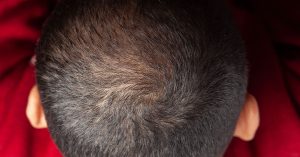The link between a man’s mind and his body is a powerful connection. What happens in the brain has an impact on the body, and what occurs in the body affects the brain. The relationship between physical and mental health extends to all aspects of our well-being, including the health of our hair.
Are There Psychological Causes of Hair Loss?
Our state of mind can contribute to excess shedding and hair loss. Stress and mental illnesses can disrupt the hair’s growth cycle, cause the immune system to attack one’s hair follicles, or spark behavioral issues detrimental to hair health.
To make matters worse, hair loss can cause additional stress… perpetuating an endless feedback loop of stress and stress reactions. Breaking the cycle isn’t always simple or easy, but your health – and that of your hair – depends on it.
What Does It Mean When a Man Loses Hair?
Because men often associate a full head of hair with attractiveness, youth, and virility, hair loss can have a psychological impact, affecting your self-esteem, confidence, and satisfaction with one’s looks.
Studies indicate that there’s a greater incidence of depression and anxiety among men who experience hair loss than those who do not. Men who are young, uninvolved in a romantic relationship, or have pre-existing self-esteem issues have an even greater risk of psychological ailments resulting from hair loss.
Can Overthinking Cause Hair Loss?
There may be something to the old saying that “grass never grows on a busy street.” Men who overthink to the point of becoming stressed are much more likely to experience hair loss.
Too much stress is associated with telogen effluvium, where large numbers of hair follicles are forced into a resting phase, disrupting the healthy hair growth cycle. Stress is also implicated in alopecia areata, where the body’s immune system attacks the hair follicles.
What Mental Illness Makes Your Hair Fall Out?
Any mental disorder that causes emotional stress can contribute to hair loss. Some conditions that may cause excess hair shedding are anxiety, OCD, bipolar disorder, PTSD, and schizophrenia.
A disorder called trichotillomania actually creates the urge to pull out hairs from one’s eyebrows, scalp, and other areas of the body. Some medications used to treat these disorders cause additional hair loss in a small percentage of patients… but it is relatively rare, and benefits typically outweigh the risks.
Is Hair Loss from Stress Permanent?
Hair loss from stress and mental health conditions doesn’t have to be permanent. If you reduce your stress levels, it is likely your hair will grow back. This doesn’t happen overnight, but if your underlying issues are resolved, your hair could grow back within several months.
In the meantime, adopting a healthy lifestyle and seeking conservative hair restoration treatment can create optimal conditions for regrowth. If you still desire thicker and fuller hair, there are surgical options for hair restoration that can achieve the results you want.
Consultation is the First Step to a Fuller Head of Hair
If you notice excessive hair loss that may be due to stress or a psychological issue, talk with your physician about treating the underlying problem. While you work on feeling better, The Hair Center of Nebraska can address your hair loss.
A full hair and scalp analysis can determine the cause of your hair loss and guide you in selecting the treatment plan that is best for you. By setting up a consultation, you are taking the first step on your journey to a fuller head of hair and a better life. Contact us today to set up an appointment.






